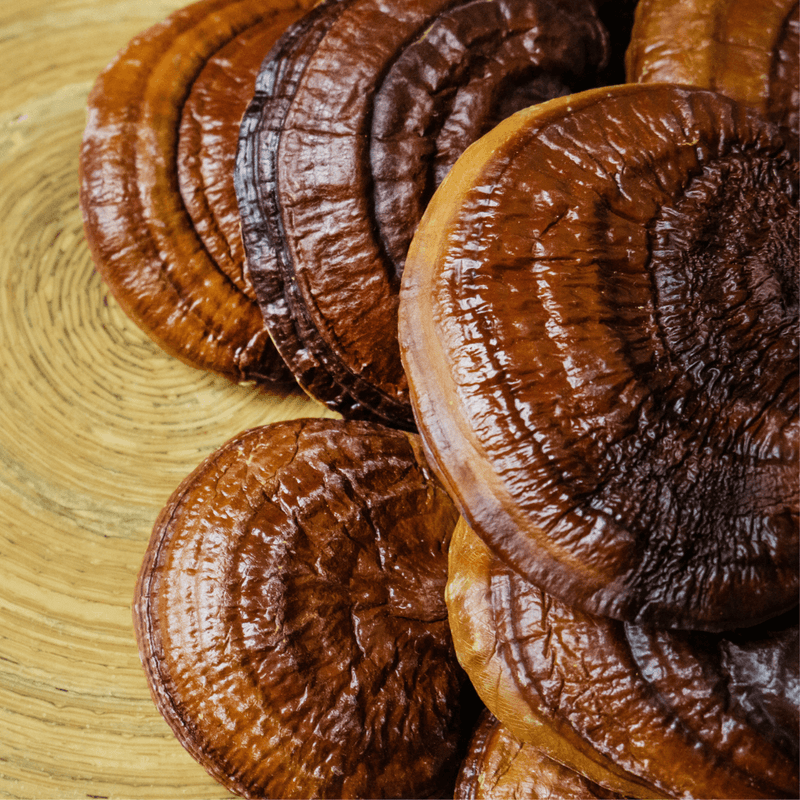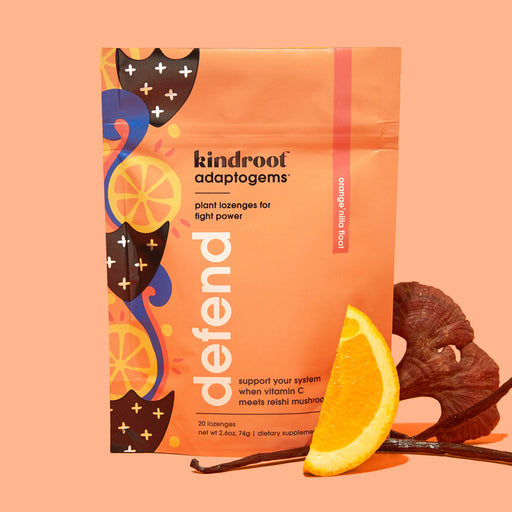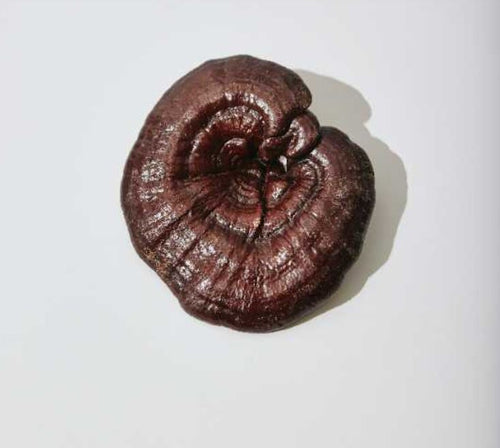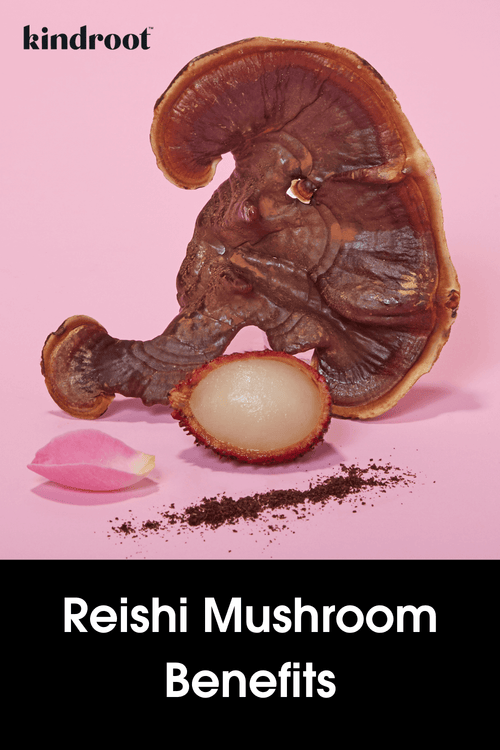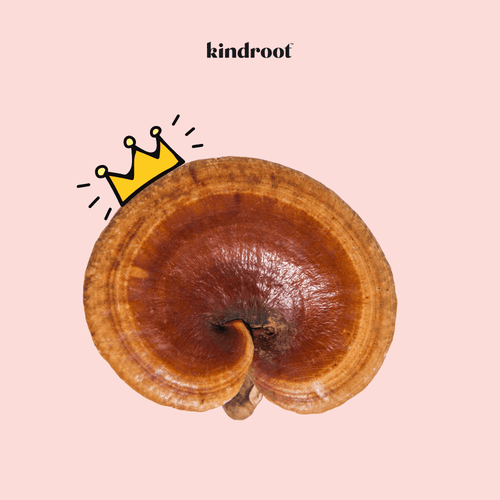Known as the “mushroom of mortality,” reishi is a staple of Chines medicine that’s been lauded for its health benefits for more than 4,000 years. Though there are many ways to consume it, reishi mushroom supplements offer flavorful convenience and your choice of delivery – but first, you need to ask whether reishi is right for you.
The following lists 20 reishi mushroom benefits backed by science and doctor advice, plus additional information such as reishi side effects, dosages, and when to take it to yield the best results.
Discover Kindroot Mood: L-theanine + reishi lozenges for stress support
Contents
- What is reishi?
- Reishi health benefits
- Do reishi mushrooms work?
- Side effects
- Dosage
- When to take reishi
- How do you feel after taking reishi?
- How long does it take to work?
- Reishi pairings
- Forms
- How to choose the best reishi supplements
Reishi benefits at a glance
Here’s a quick overview of reishi benefits; scroll down for more details.
|
1. Mood elevation 2. Immunity 3. Antidepressant 4. Anti-anxiety 5. Cancer prevention & treatment 6. Anti-fatigue (energy booster) 7. Diabetes support |
8. Antioxidant/free radical scavenger 9. Anti-allergen 10. Antibacterial & antiviral 11. Liver & gastric injury support 12. Lower cholesterol 13. Lower blood pressure 14. Better sleep |
15. Hearth health (cardiovascular support) 16. Improved memory & cognitive function 17. Skin health 18. Seizure prevention 19. Anti-inflammatory 20. Anti-aging |
Kindroot Defend: Vitamin C + reishi lozenges for immune support
What is reishi?
Reishi is a large, dark brownish-red medicinal mushroom with a glossy surface and woody texture that grows on decaying wood in warmer regions such as Asia, South America, the South Pacific and the Southeastern United States. It’s typically pronounced as “ray-shee,” and it’s known as lingzhi in China.
Reishi is said to have an earthy taste with bitter undertones (from triterpenes), but supplements mask the bitterness with sweet flavors.
There are more than 2,000 species of reishi, but the type most commonly used for therapeutic purposes is Ganoderma lucidum, a variety of red reishi. Other colors include:
- Black reishi (Amauroderma reugosum)
- Purple reishi (Ganoderma sinense)
- Yellow reishi (Laetiporus sulphureus)
- Blue reishi (Tramates versicolor, also known as turkey tail)
- White reishi (Laricifomes officinalis)

Reishi mushroom benefits
Reishi is an adaptogen – a class of herbs and mushrooms that help your body overcome and adapt to physical, chemical and biological stress.
“Reishi mushrooms are medicinal due to their adaptogenic nature. Adaptogens are herbs that help us cope with stress and maintain resilience when stress is inevitably thrown our way,” says Dr. Sydney Baker, a naturopathic doctor at Oasis Hormone Therapy and Wellness Center in San Diego. “Other than helping with stress resilience, consumption of reishi can support a healthy immune system, reduce fatigue and even support sleep. Reishi also contains antioxidants, prebiotic fibers, vitamin D precursors and other enzymes that support overall health.”

Gentle and naturopathic, reishi contains a host of beneficial elements, including:
- Polysaccharides
- Dietary fibers
- Oligosaccharides
- Triterpenoids
- Peptides
- Proteins
- Alcohols
- Phenols
- Mineral elements (zinc, copper, iodine, selenium, iron)
- Vitamins
- Amino acids
Reishi is used chiefly as an immune enhancer and health supplement, and it could treat conditions such as:
- Hypertension
- Diabetes
- Gastric ulcers
- Asthma
- Hepatitis
- Neurasthenia (chronic fatigue syndrome)
- Atherosclerosis
- Leukopenia
- Cancer
Reishi health benefits
Researchers have linked the following health benefits to reishi mushrooms and supplements.
Mood elevation/antidepressant
Reishi mushroom elevates your mood and acts as an antidepressant. Research shows that Ganoderma lucidum polysaccharides (GLP) is an anti-inflammatory and immunomodulator that could treat major depressive disorder.
Related: 5 drink recipes to help boost your mood
Reishi may affect neurotransmitters and serotonin to elevate mood and alleviate depression. One study found that women with fibromyalgia reported improved happiness and life satisfaction after taking reishi.

Further Reading: Activities that improve your mood
Immunity
Reishi may be a significant immune booster, with studies showing that G. lucidum polysaccharides regulate immune function and promote antigen production, humoral immunity and cellular immunity.
Related: Top 5 immunity enhancers from Chinese medicine
“Sometimes referred to as the ‘mushroom of longevity,’ reishi boosts the production of specific cells in the immune system that produce antibodies and other immune cells that help us fight off infections,” says Dr. Baker.

The National Library of Medicine reports significant evidence that Ganoderma lucidum supports immunostimulating activities via cytokine production, the proliferation of T and B lymphocytes, splenic mononuclear cells, NK cells and dendritic cells. Moreover, reishi’s polysaccharides suppress tumor cells and enhance immune responses in patients with advanced-stage cancer.
Related: How melatonin boosts immunity, according to experts
Anti-anxiety
Reishi might also be an anxiolytic, or anti-anxiety treatment. Studies have shown that reishi’s effects are comparable to diazepam, also known as Valium. The fungus has tranquilizing properties that are useful for treating anxiety, and research suggests reishi extracts could be used to manufacture anti-anxiety medications. In one study, reishi alleviated maternal separation anxiety and depressive behaviors in mice by reducing inflammation in the periphery and brain.
Related: Does melatonin help with anxiety? See what doctors say
Cancer prevention and treatment
Reishi may also help treat and prevent cancer. One study found that reishi extracts could enhance immune function and boost the activity of T lymphocytes, macrophages and natural killer (NK) cells. The study authors reported a significant decrease in antigen levels in prostate cancer patients, and surmised reishi’s antioxidant and radical-scavenging properties could help prevent cancer and shrink tumors.
Another study found that reishi suppresses tumor invasiveness in breast and prostate cancer patients, while another found that it has an antitumoral effect in breast cancer, hepatoma and myeloid leukemia patients.

Still other studies have shown reishi’s ability to help prevent cancer and kill cancer cells in colorectal and other types of cancer. Some suggest reishi could be an effective alternative to conventional cancer treatment.
Overall, reishi has been found to induce cell-cycle arrest and apoptosis (cell death) in various human and rodent tumor cells, including:
- Lymphocyte leukemia
- Lewis lung carcinoma
- Reticulocyte sarcoma
- Sarcoma
- Human leukemia
- Hepatoma
- Liver tumors
- Breast cancer
- Prostate cancer
- Cervix uteri tumors
- Ovarian cancer
- Colonic cancer
- Lung carcinoma
- Small-cell lung carcinoma
- Low-grade bladder cancer
More research is needed, but studies suggest that reishi may inhibit cancer cell invasion – and it’s even been associated with cancer remission.
Anti-fatigue, energy booster
In addition to improving mood, reishi mushroom supplements may increase energy and reduce fatigue. One study found that people with neurasthenia – chronic fatigue syndrome – exhibited significant improvements in energy levels after taking reishi. It’s also been shown to improve cancer-related fatigue in breast cancer patients.
Diabetes support
Reishi may have mild antidiabetic effects. One study found that reishi significantly decreased glucose levels in diabetic mice, while another found that it can enhance insulin secretion and decrease glucose output in late-stage diabetes. Other studies suggest that positive effects can be seen within a few weeks of taking G. lucidum.
Antioxidant
The polysaccharides and triterpenoids in G. lucidum have antioxidant properties, which protect cells from oxidative damage, scavenge free radicals, protect immune cells and decrease mutation risk. In addition, reishi’s antioxidative effect has been shown to protect the liver and kidneys from damage.

Anti-allergen
Some studies have suggested that reishi could effectively treat people with allergic rhinitis. It may have an antihistamine effect, and it’s also been shown to relieve itching caused by mosquito bites.
Antibacterial and antiviral properties
Antibiotic resistance is a major concern for healthcare, and researchers have discovered that reishi could be an effective alternative to traditional antibiotics. The National Library of Medicine reports that G. lucidum injections increased mouse E. coli survival rates from 30% to 80%. One study even found that G. lucidum was more effective than antibiotics against bacteria such as E. coli and Salmonella.
In addition, reishi inhibits viral replication by interfering with viral absorption in herpes simplex types 1 and 2, hepatitis B and HIV. G. lucidum has also been shown to decrease pain and promote healing in varicella-zoster virus, and improve recovery time for herpes genitalis.
Liver and gastric injury support
Ganoderma lucidum is a hepatoprotective agent, meaning reishi could protect the liver from damage. Research shows that reishi lends protective properties by being a free radical scavenger and inhibiting MDA formation, among other mechanisms. Studies have found that reishi’s polysaccharides can help improve cirrhosis and lower liver collagen content.
Reishi may also support the gastric system. One study found that Ganoderma lucidum significantly accelerated gastric ulcer healing by 40 to 56%.
Lower cholesterol and blood pressure
Peptides found in reishi extract have been shown to lower blood pressure, and researchers are exploring their potential use as functional foods and anti-hypertension medications.
In addition, Ganoderma lucidum may lower cholesterol via various mechanisms. In one study, rats that ingested G. lucidum had reduced total cholesterol and LDL (bad) cholesterol levels and increased HDL (good) cholesterol.
Heart health
Reishi may also offer cardiovascular support. In addition to lowering cholesterol and blood pressure, studies have shown that Ganoderma lucidum prevents heart damage, so it could be an effective way to help prevent cardiovascular disease.
Improved memory and cognitive function
Studies suggest that Ganoderma lucidum has potential as a nootropic – a class of supplements that enhance cognitive function – and can help improve cognitive patterns. Evidence indicates that reishi improves spatial learning and memory deficits and could be used to help combat Alzheimer’s disease.
Related: Does melatonin make you smarter? Here's what doctors say
Skin health
Reishi’s antioxidant and anti-inflammatory properties may make it an effective skincare supplement. Studies have shown that Ganoderma lucidum promotes wound healing, prevents post-burn infections, helps burns heal faster and has potential as a skin cancer treatment.
Seizure prevention
Oligosaccharides found in reishi have anticonvulsant properties, which means they can potentially prevent seizures. The oligosaccharides also serve as neuroprotectors which may help prevent damage from seizures.
Anti-inflammatory
Reishi is an anti-inflammatory that can prevent chronic inflammation. Chronic inflammation has been shown to correlate with autoimmune disorders such as rheumatoid arthritis, lupus, asthma, inflammatory bowel disease and Chron’s diseases, so reishi has potential for preventing or treating these conditions.
Anti-aging
Reishi’s role as a free radical scavenger could help keep you young. Studies show that Ganoderma lucidum improves the age-related decline of mitochondria antioxidants. You might be unable to turn back the clock, but reishi supplements could help slow it down.
Sleep
Reishi is also often used as an insomnia treatment. Multiple studies have demonstrated that reishi promotes and prolongs sleep via numerous mechanisms, including neurological interactions and serotonin pathways.

Further Reading: More important reishi benefits
Do reishi mushrooms work?
Scientific research proves that reishi may have significant health benefits.
“Like most functional mushrooms, reishi contains an array of biologically active polysaccharides, which stimulate the immune system,” says Dr. Baker. “This is why some mushrooms, including reishi, have been shown to have anti-cancer effects – they are stimulating the body’s own immune system to fight off disease.”
Learn More: Why reishi is good for the body
Reishi mushroom side effects
Reishi side effects are typically minor and include:
- Dizziness
- Nausea
- Dry mouth
- Itching
- Rash
Pregnant and breastfeeding women, people with blood disorders or low blood pressure and those undergoing surgery should consult their doctors before taking reishi.
“Reishi should be used with caution in pregnant and breastfeeding mothers as well as individuals with low blood pressure, as reishi has been shown to lower blood pressure,” says Dr. Baker. “Some studies show that reishi can potentiate blood thinners, so individuals already taking blood thinners or anyone with an upcoming surgery should avoid it for safety.”
Though it’s a mushroom, reishi won’t get you high and doesn’t cause hallucinations. You can’t “trip” on reishi because it’s not a psychedelic.
Reishi dosage
Recommended dosages vary depending on the form of reishi you’re using. For supplements like Kindroot lozenges, the recommended dose is 10mg per lozenge.
“Dosage is dependent upon whether you are taking whole, dried mushrooms or something like a tincture, or alcohol extract,” says Dr. Baker. “Most research shows that for whole food mushroom powder, you’d need to be taking two grams daily to get an adequate amount of immune-supporting polysaccharides.”
When to take reishi
Many experts recommend taking reishi in the evening, typically between 5 and 8 p.m.
“Because reishi can be calming and sleep-promoting, I recommend taking it closer to bedtime so it can work its magic,” says Dr. Baker.

How do you feel after taking reishi?
When taken as recommended, reishi should elevate your mood and lend a sense of relaxation as stress and anxiety melt away.
“You may not feel any physical effects at first, but if you consistently ingest the mushrooms, you may notice clearer thinking, better sleep and more balanced moods,” says Dr. Baker.

Further Reading: Why we love reishi mushroom
How long does reishi take to work?
You may begin to feel reishi’s mood-elevating effects in about 30 to 60 minutes after taking it. Other health benefits could take a few weeks to develop.
“This is dependent on the individual, as everyone’s system is sensitive to different things and reacts independently. Typically, patients report significant improvement within three to four weeks, but things like deeper sleep and calmness may show up quicker,” says Dr. Baker. “Like most botanical medicine, good things take time.”
Reishi pairings
Reishi pairs well with other ingredients to amplify benefits for different purposes. For example, reishi and L-theanine work well together to elevate mood and relieve stress, while a reishi and vitamin C blend is a powerful immunity booster.
Reishi forms
Reishi comes in many different forms and formulations. You can purchase raw reishi and cook it or make it into tea, though you’ll also need to store and prepare it. Many people prefer reishi supplements because they’re more convenient and flavorful.

Related: Why vitamin delivery matters
Reishi supplements include:
- Lozenges
- Gummies
- Pills
- Capsules
- Powders
- Teas
- Hot chocolate
- Tinctures
- Sprays
- Liquid drops
- Vapes/pens/diffusers
- Chocolate/candies
How to choose the best reishi supplements
It’s vital to buy reishi supplements from reputable brands that follow quality control processes for accurate, consistent dosing. One study of 19 reishi products sold in the United States found that only five – just 26.3% – had ingredients that matched their labels, underscoring the importance of ensuring you’re getting reishi supplements from a trusted source.
Related: The best melatonin supplements, according to doctors
You’ll also want to ensure any supplement adheres to your health and dietary considerations. For example, people who have diabetes may want to avoid supplements that are high in artificial sugars, while others might prefer vegan reishi supplements.
Beyond that, choose a supplement that’s available in your preferred delivery method (lozenge, pill, powder, tea, etc.) and flavors. For example, Kindroot Mood combines tropical lychee and rosewater for a floral flavor, while Kindroot Defend blends bright orange and smooth vanilla for float flavor vibes.
Reishi mushroom supplements boast multiple benefits that can help you feel better, bolster your immune system and protect your long-term health, but they’re not created equal. Compare your options to ensure you get high-quality reishi in forms and flavors you’ll enjoy.
Ready to enjoy the benefits of reishi mushroom? Try Kindroot!
Kindroot Mood: Tropical lychee + rosewater-flavored lozenges with L-theanine & 10mg reishi for mood support
Kindroot Defend: Orange-vanilla-flavored lozenges with Vitamin C & 10mg reishi for immune support
Disclaimer: The information stated in this article is for educational purposes only. The information stated is not intended to treat, diagnose or cure any disease, condition, or other physical or mental ailment of the human body. The desire to make any changes to one's dietary habits or supplementation should be consulted and discussed with a licensed medical professional.
